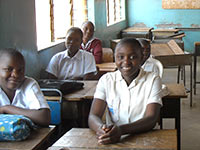
Likuni Girl's School in Lilongwe, Malawi
Lin Larson always dreamed of going to Africa. When she finally arrived on the continent, Larson was able to give African students something of their own to dream about: the chance to study in the United States.
Larson, a senior international specialist at the University of California-Berkeley, traveled to Africa in the fall of 2012 to recruit students to attend her institution through sponsorships underwritten by the MasterCard Foundation Scholars Program.
The MasterCard Foundation has partnered with several schools in the United States and around the world to provide educational opportunities to some of the most disadvantaged students in Africa and other regions across the globe. Thanks to the $500 million in scholarship funds that the foundation has pledged, universities such as the University of California-Berkeley are able to offer educational opportunities to aspiring bachelor's and master's degree students who otherwise would not be able to afford such an education. NAFSA’s Executive Director and CEO Marlene M. Johnson was recently appointed to the External Advisory Committee for The MasterCard Foundation Scholars at Berkeley, along with Nobel Peace Prize Laureate Leymah Gbowee and other international leaders, to advise and assist with successful implementation of the program.
Larson, who visited Ghana, Malawi, South Africa, and Zimbabwe in September 2012, said her goals included making sure that students understood Berkeley was now an option for them. "Berkeley had never recruited in Africa because we had never been able to offer scholarships," she said.
She also worked hard to make the undergraduate admissions process as simple as possible. "I told them, ‘There is no need for letters of recommendation. You tell us your story,' and then I focused on explaining how to best relate their story to us."
Throughout her trip, Larson took photos and notes about living conditions, education systems, and culture in order to provide context for her colleagues in Berkeley's admissions office. Average applicant SAT scores can vary greatly from one country to another, and Larson was determined to prepare her colleagues to approach each application with relevant background information.
"I try to keep their minds open. It's not just grades or test scores; you have to put the student in the context of the environment. I show them photos that I took so that they have a visual of what the schools, classrooms, food, and street scenes look like. We talk about the education systems because they are all different."
And some of the differences were astounding to Larson. "There may be 50 students in the classroom and 14 desks. Chalkboards with no chalk. Libraries that are half the size of a normal classroom with books that have been there for 30 years." Despite some of the environments, these students "would do anything to get the best education under some of the most difficult situations I have seen," said Larson.
Many months of preparation and planning preceded her recruiting trip, and Larson believes that her visit was a success. "On a professional level, having the opportunity to represent the institution in a new territory was really rewarding," she said. Several scholarship students are already on Berkeley's campus, and more are expected for years to come.
Photo credit: Lin Larson
Excited 2 serve on External Advisory Com for @mcfoundation Scholars Program at @ucberkeley - bringing talented African students to the US
— Marlene M. Johnson (@MarleneAtNAFSA) February 21, 2013
